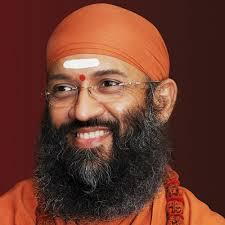An Interview with His Holiness Swami Vidyadhishananda
By Mike Hart

I had the privilege of speaking by phone with His Holiness Swami Vidyadhishananda this past week and was impressed that he is not only a man of great spiritual and intellectual knowledge, and experience but is also a very down to earth and a practical individual. What he has to teach us, he learned through yogic mindful living in the Himalayan Mountains and participating in the unbroken oral traditions there. While I hope in this interview to convey some of his thoughts about his upcoming visit to Houston, I find that I am unable to fully convey the impact of his voice. I hope that many of you will be able to attend the public lectures and workshops that he will be holding and hear his wonderful, gentle voice.
Mike: “Swami Vidyadhishananda, what is your purpose in coming to Houston?”
Swami Vidyadhishananda, “I have been coming to Houston for some time, but in the past two years I could not visit. I want to reach out to beginners as well as more advanced students. Much yoga in the West is only at a certain level. One can practice higher yoga but that is not easily available. There is breathwork combined with postural movement which is a step into the higher yoga. However only in the Himalayas do you have the monastic traditions where Vedic philosophy, yoga and meditation are taught through a teacher-disciple relationship in a pristine environment. It is a living tradition that is mostly oral and experiential where we actually practice the techniques for human excellence. In the Himalayas it is easier to practice the higher yoga and the unbroken tradition is preserved. One of the reasons I was sent to the West as a head of mission was to reveal these traditions to those who cannot retreat to the mountains or access such teachers.”
Mike: “I see that you will begin your work here with a two day workshop on Himalayan pranayama. Tell us something about that.”
Swami Vidyadhishananda: “In the Himalayas each major mountain has its own meditation tradition, its own lineage. The knowledge is propagated from teacher to student through the lineage. I will reveal our technique of chanting with breathing in a special way. It is the next level beyond regular breathwork. The introduction begins with Ujjayi, throated breathwork and Udgitha, a breathing technique for increasing awareness of one’s internal sound. I will also teach techniques for cleansing the nadi (energy channels) and balancing agni (digestive fire). Participants will learn a core set of Himalayan pranayama techniques which can be practiced daily to increase physical energy, bring about mindfulness and restore wellness.”
Mike: “On the evening when you will be teaching in The Heights, my neighborhood, you will be introducing us to yogic upasana meditation. How is this form of meditation different from other forms that we might practice?”
Swami Vidyadhishananda: “Upasana is a kind of contemplation or conception-based meditation. One such practice is about conceiving light in a particular space within the body. I say conceive and not visualize because visualization might deviate into imagining something that is not a subtle reality. The concept is that light within the body can be meditated upon if guided properly, but without involving imagination. Emptiness of the mind assists in overcoming the internal chatter, but the goal is to conceive light, especially in the heart. I will not just lecture on it, we will actually practice it through a guided meditation.
Mike: “As a former school teacher, I’m interested in different forms or styles of learning. Could you tell us about Vedic holistic learning?
Swami Vidyadhishananda: “Traditional Vedic learning is nonlinear and promotes accelerated learning. The methods have been successfully practiced by generations of students to improve memory and preserve lineage-based indigenous knowledge. The combination of sublime recitation and breathing techniques support and promote accelerated learning. This is not a left-brain oriented education system. The emphasis is on whole-brain learning. Children who feel inspired by whole-brain learning and grow up with this system show emotional maturity and exceptional memory. This type of schooling brings about development of personality and graduation with values. I will explain why breathless chanting of verses by heart is a hallmark of holistic learning for children and adults alike.”
Mike: “Thank you for granting this interview and for your time. Are there any other things that you would like our readers to know about your visit to Houston?”
Swami Vidyadhishananda: “We welcome ALL interested seekers. All the events are free with registration. Our goal is to put out the teachings and share their values. There is something for everyone: child, adult, seeker, beginner, advanced student.
For more information go to Hansaveda Self Enquiry Life Fellowship and Hansaveda Mulitmedia.
